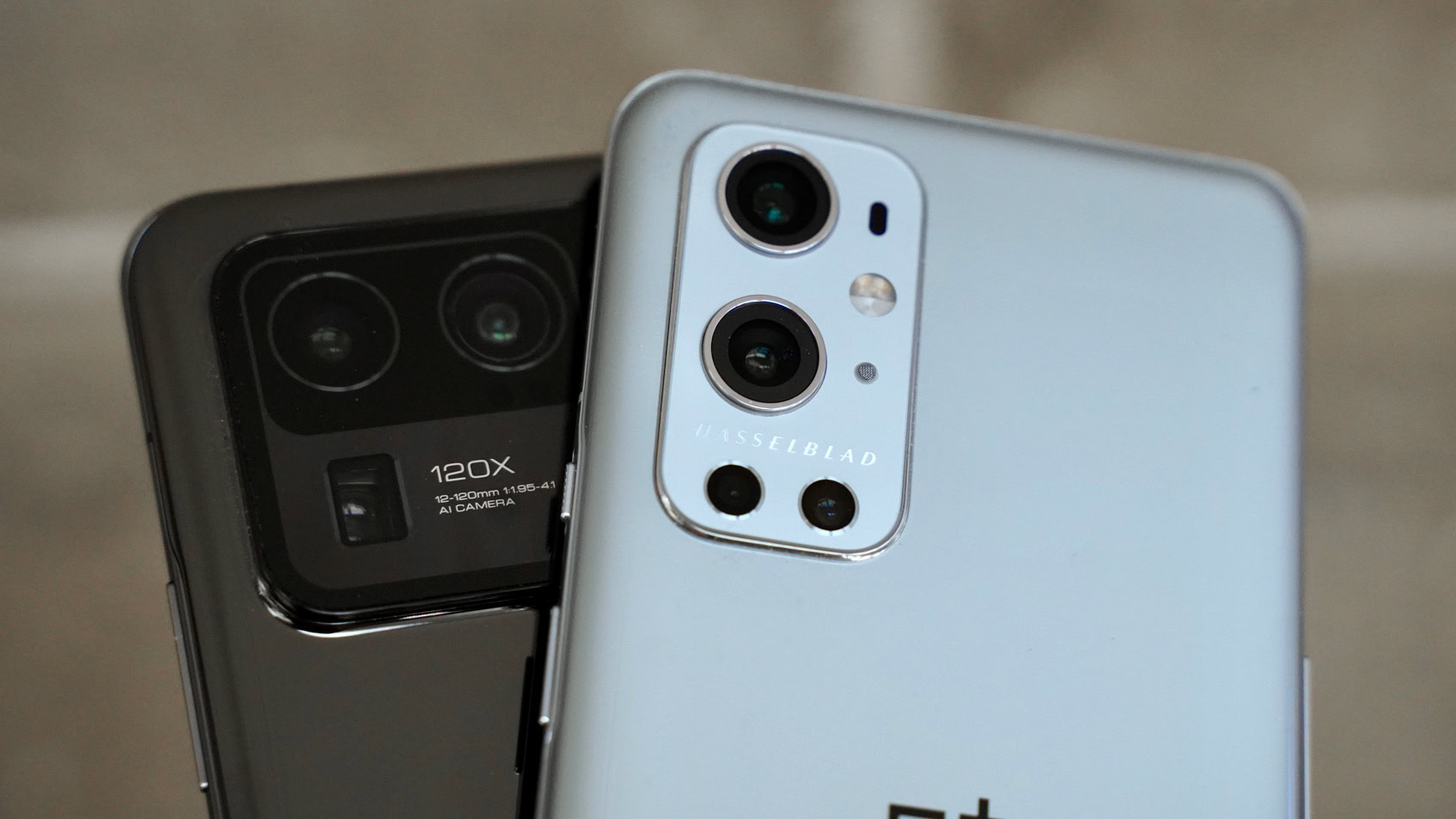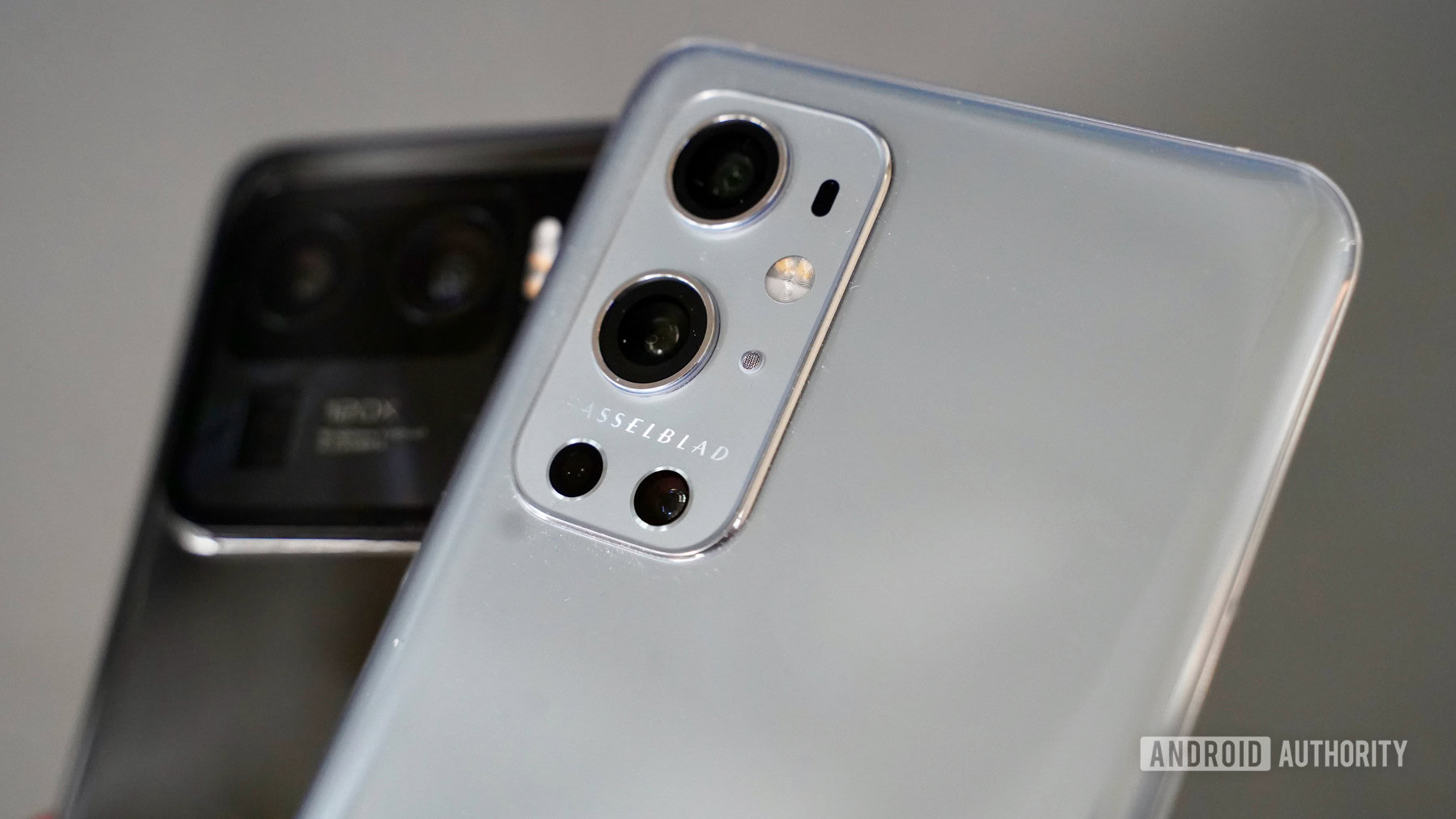Affiliate links on Android Authority may earn us a commission. Learn more.
Camera shootout: OnePlus 9 Pro vs Xiaomi Mi 11 Ultra

Both OnePlus and Xiaomi upped the camera ante with their latest smartphones, the OnePlus 9 Pro and Xiaomi Mi 11 Ultra. OnePlus teamed up with Hasselblad to improve its image processing, while Xiaomi went all out with a full slate of capable lenses. These phones are at slightly different price points, but they are gunning for the same competitor: Samsung’s Galaxy S21 line, or more specifically the series’ photography champion, the Galaxy S21 Ultra. What does it take to compete with Samsung? Plenty.
In this OnePlus 9 Pro vs Xiaomi 11 Ultra camera shootout, we’ll compare a number of image samples across different shooting conditions to see which phone takes the better picture. You’ll be able to chime in and select your own winner through the poll at the bottom of the article.
The results should be easily differentiated from one another. In addition to different sensors and image processing algorithms, the two phones boast entirely different lens glass and focal lengths. The only thing the 9 Pro and Mi 11 Ultra share is the Qualcomm Snapdragon 888 processor. How will this jumble of software and parts differ in this OnePlus 9 Pro vs Xiaomi 11 Ultra camera test? Let’s dig in.
Our take: OnePlus 9 Pro review | Xiaomi Mi 11 Ultra review
OnePlus 9 Pro vs Xiaomi Mi 11 Ultra: Camera specs
| OnePlus 9 Pro | Xiaomi Mi 11 Ultra | |
|---|---|---|
Main camera | OnePlus 9 Pro 48MP, f/1.8, 1/1.43” sensor size, 1.12 μm/48M pixel size; 2.24 μm 4-in-1 Super Pixel, 7P lens, 23mm equiv OIS, EIS Sony IMX789 | Xiaomi Mi 11 Ultra 50MP, f/1.95, 1/1.12" sensor size, 1.4μm pixel size, 2.8μm 4-in-1 Super Pixel, 8P lens, 85-degree FoV Supports OIS, dToF laser focus Dual Pixel Pro, Dual Native ISO Fusion, Staggered-HDR |
Wide-angle camera | OnePlus 9 Pro 50MP, f/2.2, 1/1.56” sensor size, 7P lens, 14mm equiv. Sony IMX766 | Xiaomi Mi 11 Ultra 48MP, f/2.2, 1/2.0" sensor size, 0.8μm pixel size, 1.6μm 4-in-1 Super Pixel, PDAF, 7P lens, 128-degree FoV Supports macro shooting |
Telephoto camera | OnePlus 9 Pro 8MP, f/2.4, 1.0 μm pixel size 2x optical zoom | Xiaomi Mi 11 Ultra 48MP, f/4.1, 1/2.0” sensor size, 0.8μm pixel size, 1.6μm 4-in-1 Super Pixel Supports OIS, PDAF 5x optical zoom, 10x hybrid zoom, 120x digital zoom |
Video | OnePlus 9 Pro 8K @ 30fps 4K @ 30/60/120fps 1080p @ 30/60fps | Xiaomi Mi 11 Ultra 8K @ 24fps 4K @ 30/60fps 1080p @ 30/60fps 720p @ 30/60fps |
Front camera | OnePlus 9 Pro 16MP, f/2.4, 1.0 μm pixel size, EIS Sony IMX471 | Xiaomi Mi 11 Ultra 20MP, f/2.2, 0.8μm pixel size, 1.6μm 4-in-1 Super Pixel 78-degree FoV, FF |
Front video | OnePlus 9 Pro 1080p @ 30/60fps | Xiaomi Mi 11 Ultra 1080p @ 30fps 720p @ 30fps |
Daylight
Daytime photos are when every camera should be at its absolute best. There’s ample light to cover everything, colors will be at their most natural, and shadows are deep and dark. The trick is capturing that color accurately and with good detail in the shadows.
See also: The best camera phones you can get
In this first image, the pub looks a more pleasant shade of green in the OnePlus 9 Pro shot. The Mi 11 Ultra’s shot looks a bit washed out here. There’s plenty of detail in both images.
Here’s a standard landscape with green grass, brown trees, and blue sky. It should be a slam dunk for both phones. The 9 Pro shot is a bit cooler than the shot from the Mi 11 Ultra, which comes across as a bit warmer. Otherwise, these images share strong focus and clarity. Details of the small city below are just barely visible in both shots.
This up-close shot of the cannon is dead even between the two. They are different, but in a way that doesn’t really matter.
Detail and HDR
There’s a lot going on when examining the detail in this shot. You’ve got brick, mortar, lots of green discoloration, and other color anomalies. More importantly, there’s a placard with some text on it. The text visible in the 9 Pro shot comes across just a bit cleaner. In fact, the entire 9 Pro shot is sharper and clearer looking than the Mi 11 Ultra’s, which comes across as slightly noisier and less refined.
Related: Camera shootout: OnePlus 9 Pro vs Samsung Galaxy S21 Ultra
Here’s a challenging HDR sample. The sun was directly above the bridge, casting a deep shadow onto the support structure of the bridge. Here, the OnePlus 9 Pro absolutely spanks the Xiaomi Mi 11 Ultra. It delivers far more detail in the dark regions, which are all but obscured in the Mi 11 Ultra shot.
Color
When you’re looking at color, there are personal preferences to consider. Are the colors true to life? Do they represent what your eyes saw in the real world when you took the photo? Some phones boost colors in a bid to make their photos look more vibrant. Some people prefer that look, while others prefer more natural tones.
I’m not sure what’s going on with this set of photos. The Mi 11 Ultra clearly has some issues processing yellow. The yellow color produced by the OnePlus 9 Pro is far more accurate to real-life than that of the Mi 11 Ultra, which borders on orange.
The Mi 11 Ultra didn’t get the greens quite right in the shot with the flowers, either.
Here the Les Paul is more accurate when captured by the OnePlus 9 Pro. There’s just too much extra coloration being applied in the shot from the Mi 11 Ultra. I think the shot from the 9 Pro is slightly sharper, as well.
Same goes for this image. The blue is closer to real-life from the 9 Pro when compared to the Mi 11 Ultra. Moreover, the shot from the Mi 11 Ultra has extra sharpening, while the 9 Pro’s shot is a bit soft.
Portraits and selfies
Bokeh-style portraits and selfies are available on both phones. Here is a smattering of samples from both the main camera and the rear camera. One thing worth pointing out is that the Xiaomi Mi 11 Ultra has a selfie preview screen on the rear of the phone, which allows users to use the rear camera for selfies. This leads to dramatically better selfies when taken with the rear camera, though I suspect people will still use the front-facing camera most often for their selfies due to the larger preview screen.
Here’s a look at the way the phones handle bokeh shooting. Each one was able to pull the statues out and blur the background, but you can see more detail in the shot by the Mi 11 Ultra, which is also better exposed.
In this series of selfies, the sample from the OnePlus 9 Pro is inexplicably soft. I’m not thrilled with it. The shot from the Mi 11 Ultra is sharper, but it has done way more processing on my skin and made me look like a mannequin — and that was with the beauty filter set to low! Thankfully you can turn it off entirely if you wish.
In this set of self-portraits, again, the sample from the OnePlus 9 Pro is soft while the image from the Mi 11 Ultra is over-processed. I can’t say I am thrilled with the results from either camera here.
Zoom and ultra-wide
Both cameras boast dedicated zoom hardware. Where the OnePlus 9 Pro has a pretty simple 3.3x optical zoom camera, the Xiaomi Mi 11 Ultra has a periscoped telephoto lens that is capable of up to 5x optical zoom and 120x digital zoom. That leads to quite a difference in the photos.
Here’s a simple zoom shot at each camera’s max optical zoom range. You can see how the Mi 11 Ultra crops in closer. The shots are about on par as far as detail and sharpness are concerned.
In this and the following shots, you can see the difference between the 0.6x and 0.5x magnification in the ultra-wide lenses. Other than the magnification, they are close to equivalent. There’s perhaps a hair more detail visible in the shadows of the shot taken by the Mi 11 Ultra.
In this last wide-angle sample, I like the exposure from the 9 Pro more. The sky is bluer and there’s more visible detail in the trees behind the falls. In the Mi 11 Ultra shot, the trees and damn building blend together. That said, there’s nothing terribly wrong with either of these images.
Here you can see how the zoom levels work. I’ve included the natural zoom from each of the lenses as well as a hybrid 10x zoom so you can see how each camera handles cropping. Each series is about equivalent in terms of exposure, detail, and color.
Low light
Low light shooting is difficult for phones, which have small sensors and are subject to lots of hand shake. Both phones have a mode for shooting in the dark and they handle things differently. You’ll see the below results are quite divergent.
In this first example, the shot from the 9 Pro is more natural-looking and certainly more true to the actual scene at hand. The sample from the Mi 11 Ultra is stunningly over-exposed and given a yellow hue (something we’ve noticed throughout with the Xiaomi). Granted, the Mi 11 shot pulled out more detail from what was a really dark scene, but it’s also unnatural looking.
The results of this second shot are much more aligned and I think that’s due to the presence of the lights. Either way there’s solid clarity and sharpness for what’s essentially a night shot.
OnePlus 9 Pro vs Xiaomi Mi 11 Ultra camera test: The verdict

Taken as a whole, I’m in favor of the photos captured by the OnePlus 9 Pro when compared to those snagged by the Xiaomi Mi 11 Ultra. Both cameras have strengths and weaknesses, no doubt. I think the biggest issue here is the slight bluish tinge taken on by the 9 Pro and the slight yellowish tinge taken on by the Mi 11 Ultra. However, overall the OnePlus 9 Pro comes out on top, which is impressive considering the Mi 11 Ultra’s “on paper” advantages and the 9 Pro’s cheaper price tag.
Which smartphone takes the better photos?
More importantly, I don’t think either camera quite rises to the levels of the Samsung Galaxy S21 Ultra, the Pixel 5, or the iPhone 12 Max Pro (the latter especially if you value video capture). OnePlus and Xiaomi are closer than ever, but just short of the best of the best.
Which do you prefer? Be sure to let us know in the poll above and in the comments below.